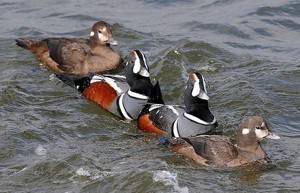
(Statewide) — Alaska’s subsistence waterfowl hunting seasons opened on April 2 and with spring migration under way hunters are reminded to practice routine hygiene when handling, cleaning and cooking the ducks, geese and other migratory birds they harvest.
Two strains of highly pathogenic avian influenza (HPAI), or “bird flu,” were found in wild birds late last year in northwestern Washington and southwestern Oregon. Since then, HPAI has been confirmed in waterfowl in11 Lower 48 states, but not Alaska. Wild birds arriving from wintering areas will likely carry avian influenza to Alaska.
Both HPAI and low pathogenic avian influenza occur in wild birds. HPAI has never been detected in Alaska and currently the risks of contracting the virus are negligible to Alaska waterfowl hunters. Worldwide, no cases of the HPAI viruses recently identified in North America have ever been transmitted to people. However, the status of highly pathogenic HPAI in North America is very dynamic.
“These strains are not believed to be easily transmitted to humans, but that could change as the viruses evolve,” said state Migratory Bird Coordinator Dan Rosenberg. “Low pathogenic avian influenza has been detected in Alaska in the past, but has not been known to affect people.”
The Alaska Departments of Fish and Game, Environmental Conservation, and the U.S. Geological Survey and U.S. Department of Agriculture continue to test wild birds for avian influenza and the geographic distribution and variety of bird species infected with these strains will likely expand.
Avian flu concerns have prompted increased surveillance of wild birds in Alaska in the past. Between 2006 and 2010, nearly 57,000 birds were tested for H5N1, and none tested positive for the virus. While no public health concerns have been associated with HPAI, these cases serve as reminders that wildlife can carry pathogens of many kinds. As always, Alaska hunters should practice routine hygiene when handling, cleaning and cooking wild game. The Department of Fish and Game recommends the following:
- Do not handle or eat obviously sick game.
- Wear rubber or disposable latex gloves while handling and cleaning game.
- Wash hands and thoroughly clean knives, equipment and surfaces that come into contact with game.
- Do not eat, drink or smoke while handling animals.
- All game should be thoroughly cooked (meat internal temperature of 165 °F).
Fish and game agencies in some Lower 48 states affected by the recent HPAI outbreak are advising falconers to avoid hunting avian species, particularly waterfowl, since raptors used for hunting are susceptible to the viruses. Alaska falconers should consider taking similar precautions.
Dead or sick domestic birds should be reported to the DEC at (907) 375-8215; for more information, contact Dr. Bob Gerlach bob.gerlach@alaska.gov in Anchorage at 375-8214. Dead or sick wild birds should be reported to ADF&G Wildlife Health and Disease Surveillance Program, phone: (907) 328-8354, email: dfg.dwc.vet@alaska.gov; or to the U.S. Fish and Wildlife Service Avian Disease Hotline at 1-866-527-3358.
For questions and answers concerning avian flu, including information for owners of domestic birds and poultry, see the sheet provided by the Alaska Department of Environmental Conservation athttps://dec.alaska.gov/eh/vet/HPAI%202015%20Q_A_4_1_15.pdf.
